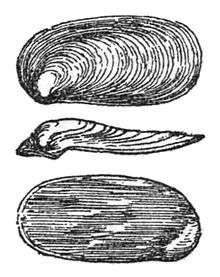Mariaella beddomei
| Mariaella beddomei | |
|---|---|
 | |
| Drawing of the internal shell of Mariaella beddomei. | |
| Scientific classification | |
| Kingdom: | Animalia |
| Phylum: | Mollusca |
| Class: | Gastropoda |
| (unranked): | clade Heterobranchia
clade Euthyneura |
| Superfamily: | Helicarionoidea |
| Family: | Ariophantidae |
| Genus: | Mariaella |
| Species: | M. beddomei |
| Binomial name | |
| Mariaella beddomei (Godwin-Austen, 1888)[1] | |
Mariaella beddomei is a species of air-breathing land slug, a terrestrial pulmonate gastropod mollusk in the family Ariophantidae.
The specific name is in honor of Richard Henry Beddome.
Distribution
This species lives in India. It is endemic to Western Ghats.[2] Its localities include Travancore Hills.[3]
Shell description
The internal shell is thinner than in Mariaella dussumieri, shelly, flat and smooth beneath, white, with close, concentric lines of growth.[3] The length of the adult shell is 12 mm, the breath is 6.5 mm.[3]
Anatomy
The body of the animal varies greatly in color from uniform ochre to deep grey-black or spotted. There are no raised ridges on the shell-lobes. It is externally similar to Mariaella dussumieri, but larger, about 4 inches (100 mm) in length when fully extended.[3] It has more numerous teeth in the radula, the number in a row being 122 . 5 . 21 . 1 . 21 . 5 . 122 (148 . 1 . 148), and the shape differing somewhat. There are also differences in the genitalia, the spermatheca and the expansion in the free oviduct (ovitheca) having different forms.[3]
References
The article incorporates public domain text from the reference.[3]
- ↑ Godwin-Austen H. H. 1888. Mol. Ind. i, page 243. Plate 58, figs. 1-1b (animal), 2-2 b (shell), plate 62, figs. 7-7a (jaw and radula).
- ↑ Mavinkurve R. G., Shanbhag S. P. & Madhyastha N. A. 2004. Checklist of terrestrial gastropods of Karnataka, India. Zoos' Print Journal 19(11):1684-1686.
- 1 2 3 4 5 6 Blanford W. T. & Godwin-Austen H. H. 1908. The Fauna of British India, Including Ceylon and Burma. Mollusca. Testacellidae and Zonitidae. Taylor & Francis, London, page 206.